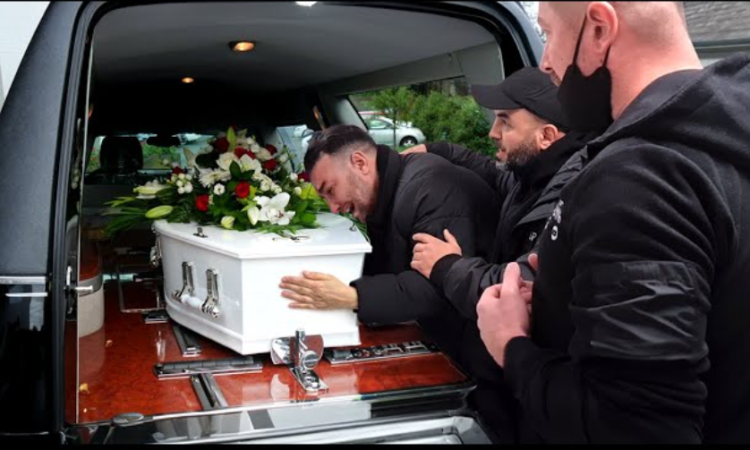Husband Stops The Hearse After He Notices Something Unusual. What Happened Next Is Terrifying

A funeral procession makes its way from a remote Indian village to a nearby funeral pyre. The deceased, a village matriarch, passed away in a house fire, and she is being sent off according to centuries-old rituals. But then, racked with grief, her husband stops the hearse. He wants to look at his wife one last time, and what he discovers is terrifying.
In the small village of Bampur in India, the community was in mourning. Bui, a 52-year-old matriarch of the village, was being prepared for her final journey. A few days before, a devastating fire had consumed her home and caused Bui severe burns over half her body. The doctors had sent the woman home after basic treatment at the MKCG Medical College and Hospital, but her condition had worsened after discharge.
Unfortunately, her 54-year-old husband, Siam, couldn’t afford to transfer her to another hospital, and the woman had eventually become unresponsive, with no signs of breathing or opening her eyes. When they had found her dead, her family had alerted locals to arrange for a hearse van to transport her to the cremation site.
The air in the village was thick with the scent of marigolds and incense. Neighbors and relatives trickled into the courtyard to pay their last respects and offer condolences to the bereaved family. In the center lay Bui, her body wrapped in a white sari with garlands of flowers. Her son Ravi, a lean man in his 30s, was there. His face was stoic, but the traces of loss were visible in the way he walked. He scurried around, loading the sandalwood for the pyre onto a small cart. It was being built a short distance from the village; this tradition would guide Bui’s soul to peace.
Bui’s sister Lakshmi murmured prayers. She sat on the ground next to a few elderly women from the village; they circled the body. This, like almost everything else on this day, was symbolic. It represented the earthly ties that bound Bui to this world. Only the children remained oblivious to the gravity of the day. They played around the edges of the village square under the watchful eyes of a dedicated child minder for the day.
Sibaram, Bui’s husband, stood apart from the throng of people. His brow was creased; his pain was tangible, and he was deep in thought. He had known Bui since childhood; their families had been intertwined through generations. They had a good marriage, better yet, a happy one. They shared joys and sorrows, respected each other, and were pillars of strength for one another in times of hardship. He would miss her most of all.
What lay heaviest on his shoulders was the memories of Bui’s vitality. Every day, her laughter echoed through the village lanes. It would all be quiet now. Then the final journey came. Sibaram excused himself. The rest of the family closed Bui’s colorful coffin and loaded it into the local hearse. Slowly, with a throng of villagers marching at a slow pace behind it, the hearse set off in the direction of the funeral pyre.
It was about halfway there when suddenly, from the dense jungle lining the road, Siam exploded into the road in front of the hearse. His eyes were wide, and there was an expression of unresolved conflict on his face. The driver hit the brakes. Sibaram walked around to the driver’s window; he insisted on seeing her for the last time. His request was unusual; it broke the solemn rhythm of the ceremony, but nobody was going to deny him his last farewell.
Ravi was riding in the back; he nodded and beckoned for Sibaram to come around the back. The casket lid creaked open. The gathering held its collective breath. It was almost sunset, and a beautiful soft light fell on Bui’s face. Then something terrifying happened—Bui’s eyes fluttered open. Her eyes were confused, and she was scared. With a raspy voice, she said, “Where am I?” A shockwave rippled through the villagers. They had heard stories of resurrections, but none of them had ever witnessed one. Yet here it was happening right before their eyes.
Ravi staggered backward, bewildered. Relatives and friends erupted into a cacophony of shock and fear. The women who had been quiet up to now wailed anew; their lamentations only served to make the situation more terrifying for the confused woman gasping to stay conscious.
Sibaram stood frozen in place; he stared at Bui. His mind grappled with the impossibility of what was happening before him. The funeral chants died away; blood drained from people’s faces as if they had seen a ghost. The children sensed the fear of the adults; little ones clung to their mothers, their eyes wide with unasked questions.
Bui was weak; she looked around, not knowing what was going on. A resurrection defied explanation; it had transformed the moment of collective grief in the village into a spectacle of collective dread. The death ceremony had become a rite of life; age-old beliefs had been turned upside down. The community’s reactions were varied; whispered conversations sparked and spread like wildfire. Some were superstitious, others were skeptical. Most viewed Bui’s return from the dead as some kind of divine sign. Yet others muttered about dark omens and unsettled spirits. For all of them, the fear of the unnatural was poignant.
Two days later, Bui and Sibaram were back in the village. They had lost their humble home but were given a small house on the edge of the village while theirs was being rebuilt. Everybody was still trying to figure out what had happened. Bui had fought valiantly against the injuries from the house fire. She’d been cared for in a poorly equipped local hospital; her conditions had oscillated between recovery and relapse.
On top of the concerns for Bui and the desire to get her the best medical care possible, financial hardships plagued the family. The medical bills devoured their meager savings. To make up for the shortfall, Ravi had borrowed money at steep interest rates and at an alarming pace. The doctor who treated Bui was more accustomed to common ailments and severe burns; he had struggled along as best as he could without holding out much hope. He had finally declared her case to be hopeless; it was only a matter of hours or days before she passed away.
Sibaram had wanted a second opinion about everything, but finances didn’t allow that. But now, with Bui’s inexplicable return from the dead, Ravi, Sibaram, and the rest of the family were questioning everything they had assumed up to now. Guilt gnawed at Ravi; he should have asked more questions, he should have fought harder for his mother’s life. Sibaram struggled with the same emotions.
The news of Bui’s miraculous resurrection spread beyond the village. Secrets aren’t well-kept in small villages in India. The family braced itself for the inevitable onslaught of curious strangers. The convention stated that they received every stranger with heartfelt hospitality, but the family wasn’t ready to deal with strangers yet; they were still trying to make sense of the recent events themselves.
Tension escalated in the village—an unhealthy mix of uncertainty and fear. Bui’s recovery was slow and arduous; she was in severe pain from the burn wounds, and regular fevers from mild infections plagued her. It was Ravi who stumbled upon a locked box while he was trying to clear the charred remains of his parents’ house. He pried it open and then realized it contained treasure. There were letters and documents inside—relics of a life his mother had kept private.
While scanning the content, Ravi realized he knew little about his mother’s life outside the village. Among the papers were letters from an old friend of Bui’s. These were exchanges of unfulfilled dreams and youthful ambitions. They told of choices forced upon Bui by rigid societal expectations and unbending family elders.
Then Ravi uncovered the crux of Bui’s secret—she had once been involved in a political movement. She had taken up the torch for the rights of marginalized communities and women across India. There were threats against her family and promises that she would be killed. In the end, she had stepped back and chosen a quieter life. But the letters showed she had never stopped caring or hoping for change.
Then, among the ruins, Ravi discovered another metal box. Inside this one were more letters and faded photographs. The letters were all from a man called Anand. Ravi had never heard the name, but the tenderness in the letters startled him. In the photographs, a youthful Bui walked arm in arm with a young man he had never seen.
Ravi was confused, and he was curious. He decided to have a chat with his mother. The conversation that followed was a revelation Ravi could have never expected. Anand had been Bui’s first love; he was a fellow student and activist from her student days. They had designed a life fighting for social change, as young people do. But their plans were derailed by severe criticism and eventually a harsh ultimatum from her family—Bui had to make a choice, her family or Anand. She couldn’t have both, so she made the sacrifice in silence. She buried her dreams for the sake of her family.
Ravi looked at her with big eyes. She took her husband and her son’s hands in hers and said, “It was all worth it. Yes, I gave up a few dreams, but just look at what I gained in the process.” She looked lovingly at both of them.
Suddenly, the community understood Bui better than they ever had. For them, she had been a resilient matriarch. Discovering that she was a passionate dreamer and a silent rebel came as a surprise. Local gossip spread the news with great glee.
Meanwhile, Sibaram couldn’t find any rest. Bui’s resurrection haunted him. Not the fact that she was back in his arms; he couldn’t be happier about that. But he needed to know what had happened. Ravi went to see Dr. Metha, the local physician who had treated Bui after the fire and later pronounced their case hopeless. Reluctantly, he revisited the case.
When it finally came, his admission was filled with regret and remorse. He really thought Bui was terminal; he could never otherwise have said that nothing more could be done. But from what he could piece together, she had been in a state of catalepsy. This, he explained, was rare; it is a trance-like condition that was induced by the combination of burns and severe trauma. Her vital signs had become imperceptible; on the day they pronounced her dead, they had listened for a heartbeat but found none. She wasn’t breathing either. For him, it was routine.
From there, her advanced age, injuries, and her general struggle to recover after the fire had made it a no-brainer. The thought of catalepsy hadn’t even entered the doctor’s minds, including his own. When Ravi thought a little deeper about everything, he realized that the traditional funeral practices in the village didn’t require an official death certificate. Mostly, the community relied on cursory visual inspections of the deceased. Add to that the almost immediate cremation rituals, and it was easy to understand the series of oversights.
If it hadn’t been for Siam’s insistence to look at his wife one last time, she might well have died on the funeral pyre, which was a horrifying thought too hard to dwell on. When Ravi returned to the village with the news, it shocked the community to the core. The fact that they had almost killed Bui with a funeral pyre made them ice-cold.
Bui’s return from the brink of death was not just a second chance for her; it was a wake-up call for the entire village. The events after the fire ignited the collective commitment to prevent such near tragedies in the future. Today, Bui’s village is working hard to modernize its traditional practices. They’re not aiming to do away with their cultural identity; not at all. Instead, they’re allowing modern science to contribute where it can and to seek further help when hope seems lost.
In this way, the community is healthier than it has ever been before. The infant mortality rate has dropped substantially, and the chances of somebody like Bui coming that close to death under similar circumstances in the future have been critically reduced. Because of her brush with death, Bui has slipped into her activist shoes again, and it makes her really happy. She’s fighting for a cause again, this time on the back of her own harrowing experiences.
Through daily letters and media interviews, she is pushing the Indian government to ensure proper healthcare for the far-flung communities in the country, and they are listening. Bui’s body hasn’t sufficiently recovered for her to travel great distances. But with regular telephonic radio interviews and the monthly newsletter, she is educating the people from surrounding areas. Thanks to technology, her voice is heard throughout India.




